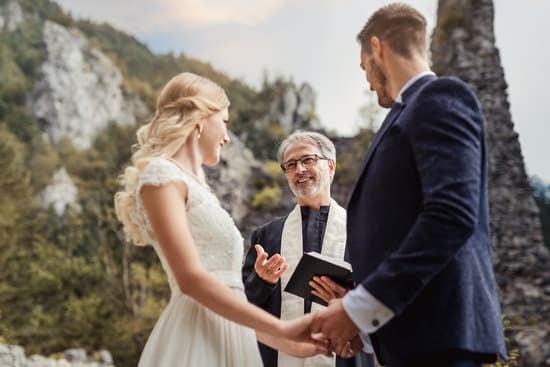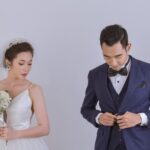A wedding officiant plays a crucial role in any marriage ceremony, as they are the individual responsible for overseeing and conducting the event. From ancient times to present day, these individuals have held significant importance in the union of two individuals.
In this article, we will explore the history, qualifications, responsibilities, and legal aspects of wedding officiants. We will also delve into the different types of wedding officiants, including religious, civil, and non-traditional officiants, as well as how they honor diverse cultural traditions.
Throughout history, wedding officiants have been an integral part of weddings and have evolved to adapt to various customs and legal requirements. Today’s officiants are required to meet certain qualifications and adhere to legal responsibilities while also understanding the significance of different cultural traditions in weddings.
For couples planning their special day, choosing the right wedding officiant is paramount in creating a memorable ceremony that aligns with their beliefs and values. Moreover, for those interested in pursuing this vocation, training and certification play a critical role in becoming a professional wedding officiant.
In this comprehensive guide, we will provide insights into what it takes to become a wedding officiant along with tips for couples looking to select the right individual for their ceremony. Join us as we explore the world of wedding officiants and shed light on their indispensable role in creating meaningful and memorable unions.
History of Wedding Officiants
Throughout history, the role of the wedding officiant has evolved significantly. From ancient times to the present day, the individuals who preside over wedding ceremonies have played a crucial part in the union of couples. In ancient civilizations, such as Rome and Greece, weddings were often officiated by religious figures or community elders who bestowed blessings and performed rituals to unite couples.
As society progressed through the medieval ages and into the Renaissance, the role of wedding officiants became more formalized. The Christian church played a dominant role in officiating weddings, with priests overseeing ceremonies and ensuring that they adhered to religious customs and traditions. During this time, marriage was not just a celebration of love, but also a legal and economic contract between families.
In modern times, the role of wedding officiants has expanded to include a diverse range of individuals from various backgrounds. While religious leaders continue to preside over traditional ceremonies, civil officiants have become increasingly common for couples seeking non-religious or interfaith unions. Additionally, there is a rise in non-traditional officiants such as friends or family members who obtain ordination to legally marry couples. This shift reflects the growing importance of personalization and inclusivity in modern wedding ceremonies.
- Throughout history, wedding officiants have played essential roles in uniting couples
- Ancient civilizations such as Rome and Greece relied on religious figures or community elders for officiating weddings
- The role of wedding officiants has evolved from religious domination to a diverse range of individuals including civil officiants and non-traditional options
Qualifications and Requirements
The person who officiates a wedding, also known as the wedding officiant, plays a crucial role in the ceremony. This individual is responsible for conducting the marriage service and ensuring that all legal requirements are met. But what does it take to officiate a wedding? What qualifications and requirements are necessary to perform this important role?
First and foremost, the requirements to become a wedding officiant vary depending on location and type of ceremony. In many places, individuals can become ordained online through religious or non-religious organizations in order to legally marry couples. Some states may have additional registration or licensing requirements for officiants, so it’s important to research the specific legal guidelines in your area.
In addition to legal requirements, there are personal qualities and characteristics that make for an effective wedding officiant. Good communication skills, empathy, and a calm presence are essential attributes for someone guiding a couple through one of the most important moments of their lives. Officiants should also be organized and detail-oriented in order to ensure that every aspect of the ceremony runs smoothly.
| Requirements | Details |
|---|---|
| Legal Requirements | Vary by location; may include online ordination or registration/licensing |
| Personal Qualities | Effective communication, empathy, calm presence, organization |
Different Types of Wedding Officiants
A wedding officiant, also known as a celebrant or ceremonial minister, plays a vital role in the wedding ceremony. They are responsible for leading and overseeing the wedding vows, exchange of rings, and other rituals as per the couple’s desires. Wedding officiants can come from religious backgrounds, be civil servants, or embrace non-traditional practices to perform wedding ceremonies.
The different types of wedding officiants include:
- Religious Officiants: These individuals are typically ordained members of clergy within a specific religious tradition. They have the authority to perform religious wedding ceremonies according to the customs and practices of their faith. Some examples include priests, ministers, rabbis, imams, and monks.
- Civil Officiants: Civil officiants are authorized by the government to legally marry couples without any religious affiliation. They often include justices of the peace, judges, mayors, and other public officials.
- Non-Traditional Officiants: As weddings become more personalized and unique, couples are increasingly choosing non-traditional officiants who reflect their individual beliefs and values. This category can encompass individuals such as family members or friends who have obtained temporary officiant status for the occasion.
It is important for couples to consider their own beliefs and preferences when choosing a wedding officiant. Whether they want a traditional religious ceremony or something more secular and personalized, there is a wide range of options available to suit their needs. The choice of an officiant can greatly influence the tone and atmosphere of the wedding ceremony.
Legal Aspects
When it comes to the legal aspects of officiating a wedding, there are several important considerations that both couples and wedding officiants need to keep in mind. One of the most crucial aspects is understanding the requirements for obtaining a marriage license in the specific location where the wedding will take place. Each state or country may have different laws and regulations regarding marriage licenses, so it’s essential for the wedding officiant to be well-versed in these legalities.
Marriage License Requirements
Before performing a wedding ceremony, the officiant must ensure that the couple has obtained a valid marriage license. This typically involves meeting certain requirements set forth by local government authorities, such as providing proof of identity, age, and residency. It is the responsibility of the couple to secure this document, but a knowledgeable and experienced wedding officiant can offer guidance on what needs to be done.
Officiant Responsibilities
In addition to ensuring that the couple has obtained a marriage license, the wedding officiant also has specific responsibilities during and after the ceremony. These may include completing and signing the marriage certificate, making sure all necessary documents are filed with the appropriate government agencies, and adhering to any legal requirements related to conducting a marriage ceremony.
It’s important for an officiant to fully understand their role in this regard in order to avoid any potential legal issues down the line. Knowing what is required legally will help ensure that everything about the marriage is conducted properly.
The Ceremony
The person who officiates a wedding, also known as the wedding officiant, plays a crucial role in creating a memorable and meaningful ceremony for the couple and their guests. From setting the tone for the event to guiding the couple through their vows, the wedding officiant holds an important position during this special occasion. This section will explore the various roles and responsibilities of a wedding officiant, shedding light on what it takes to perform this essential duty.
One of the primary responsibilities of a wedding officiant is to lead the ceremony with confidence and professionalism. This includes setting the appropriate tone for the event, whether it is lighthearted and relaxed or formal and traditional. The wedding officiant also guides the couple through their vows, ensuring that they understand their commitments to each other and articulating these promises effectively.
In addition to leading the ceremony itself, the wedding officiant is often responsible for preparing and organizing all legal documents associated with the marriage. This includes obtaining and submitting the marriage license, making sure that all necessary paperwork is completed accurately and efficiently. The officiant must also be knowledgeable about local laws regarding marriage in order to fulfill these duties effectively.
| Wedding Officiant Responsibilities | Description |
|---|---|
| Leading the Ceremony | The officiant sets the tone for the event and guides couples through their vows. |
| Legal Documentation | Responsible for obtaining and submitting marriage licenses. |
Honoring Cultural Traditions
When it comes to officiating a wedding, it’s essential to understand and respect the cultural traditions and customs of the couple tying the knot. Whether it’s a traditional Hindu ceremony, a Jewish wedding, or a non-religious celebration, the wedding officiant plays a crucial role in honoring these customs and making the ceremony inclusive for all involved.
Understanding Cultural Traditions
To effectively honor cultural traditions, wedding officiants must first educate themselves about the specific customs and rituals associated with different cultures. This may involve learning about traditional prayers, symbolic gestures, dress codes, and other elements that hold significance in various cultural ceremonies. By understanding these traditions, officiants can ensure that they are respectful and knowledgeable when incorporating them into the wedding ceremony.
Adapting to Different Wedding Customs
Once an officiant has familiarized themselves with the cultural traditions of the couple they are working with, they can then begin to adapt their approach to suit these customs. This may involve incorporating specific blessings or rituals into the ceremony, using traditional language or symbols, or making accommodations for cultural attire and music. Officiants may also work closely with the couple and their families to ensure that their customs are properly represented and honored throughout the ceremony.
Promoting Inclusivity
By embracing and respecting diverse cultural traditions, wedding officiants can help promote inclusivity and create a sense of unity during the wedding ceremony. This can be particularly meaningful for couples who come from different cultural backgrounds or who want to incorporate elements from their heritage into their special day. Ultimately, by adapting to different wedding customs, officiants play a vital role in creating a ceremony that is rich in tradition and meaningful for all involved.
Choosing the Right Wedding Officiant
When it comes to planning a wedding, one of the most crucial decisions couples face is choosing the right wedding officiant. The person who officiates a wedding plays a pivotal role in creating a memorable and meaningful ceremony. From religious leaders to civil officials and non-traditional officiants, there are various options to consider when selecting the perfect individual to oversee the exchange of vows.
Before committing to a specific wedding officiant, couples should take the time to research and interview potential candidates. It is essential to find someone who aligns with their beliefs, values, and vision for the ceremony. Whether it’s a traditional religious service or a more personalized and modern affair, finding an officiant who understands and respects the couple’s wishes is paramount.
Another important factor to consider when choosing a wedding officiant is their level of experience and expertise. Couples should inquire about their previous work, including the number of weddings they have officiated and any special skills or certifications they possess. Additionally, it’s beneficial for couples to discuss their expectations and preferences for the ceremony beforehand to ensure that the officiant can accommodate their needs effectively.
Ultimately, selecting the right wedding officiant is a deeply personal decision that requires careful consideration. By taking the time to explore all options and communicate openly with potential officiants, couples can find an individual who not only legally solemnizes their marriage but also enriches their special day with warmth, sincerity, and significance.
Training and Certification
Becoming a professional wedding officiant requires specific training and certification to ensure that they are equipped to perform their duties effectively. While the requirements may vary depending on the location and type of ceremony, there are common qualifications that aspiring officiants need to meet.
One of the most important aspects of becoming a professional wedding officiant is obtaining the necessary credentials. This often includes completing a recognized officiant training program, which covers topics such as ceremony planning, legal requirements, and cultural sensitivity. Additionally, many states or jurisdictions require officiants to obtain a license or registration to legally solemnize marriages. Understanding what is required in a specific area is crucial for anyone seeking to become a wedding officiant.
In addition to formal training and documentation, those aspiring to become professional wedding officiants can also benefit from gaining experience through mentorship or apprenticeship opportunities. This hands-on experience allows individuals to learn from seasoned officiants and gain practical insight into the responsibilities of the role. By honing their skills and knowledge through both education and real-world experience, aspiring wedding officiants can prepare themselves for a successful career in this meaningful profession.
Overall, becoming a professional wedding officiant requires dedication, preparation, and a commitment to serving couples on one of the most important days of their lives. By obtaining the necessary training, certification, and experience, individuals can embark on a rewarding career as a trusted guide in creating memorable and meaningful wedding ceremonies.
Conclusion
In conclusion, the person who officiates a wedding plays a crucial role in creating a meaningful and memorable ceremony for couples. Throughout history, wedding officiants have evolved from religious figures to include civil and non-traditional options, allowing couples to personalize their ceremonies according to their beliefs and cultural traditions.
Whether it’s a priest, rabbi, judge, or certified officiant, the individual overseeing the wedding holds the responsibility of ensuring that all legal aspects are taken care of and that the ceremony runs smoothly.
The qualifications and requirements for becoming a wedding officiant vary depending on the location and type of ceremony. Some require religious ordination, while others may only need to be recognized by the state as an official celebrant. Understanding these legal aspects is essential for both the couple getting married and the officiant themselves.
Ultimately, finding the right wedding officiant is a personal decision for couples. It’s important to consider factors such as compatibility, experience, and flexibility when choosing someone to oversee this important milestone in life. The role of the wedding officiant extends beyond simply leading the ceremony; they are entrusted with ensuring that the couple’s love story is reflected in a way that resonates with them and their guests.
Frequently Asked Questions
What Is Another Name for a Wedding Officiant?
Another name for a wedding officiant is a wedding celebrant. This individual is responsible for performing the marriage ceremony and ensuring that all the legal requirements are met.
What Do You Call a Person Who Conducts a Ceremony?
A person who conducts a ceremony, such as a wedding, is typically referred to as an officiant. This can also include individuals who lead other types of ceremonies, such as funerals or religious services.
What Is the Name of the Person Who Leads the Wedding?
The person who leads the wedding is commonly known as the officiant or the wedding celebrant. They play a crucial role in guiding the couple through their vows and overseeing the entire ceremony from start to finish. Their presence helps ensure that the wedding proceeds smoothly and according to plan.

I have been involved in marriages for over 20 years helping couples and singles understand more about them.





